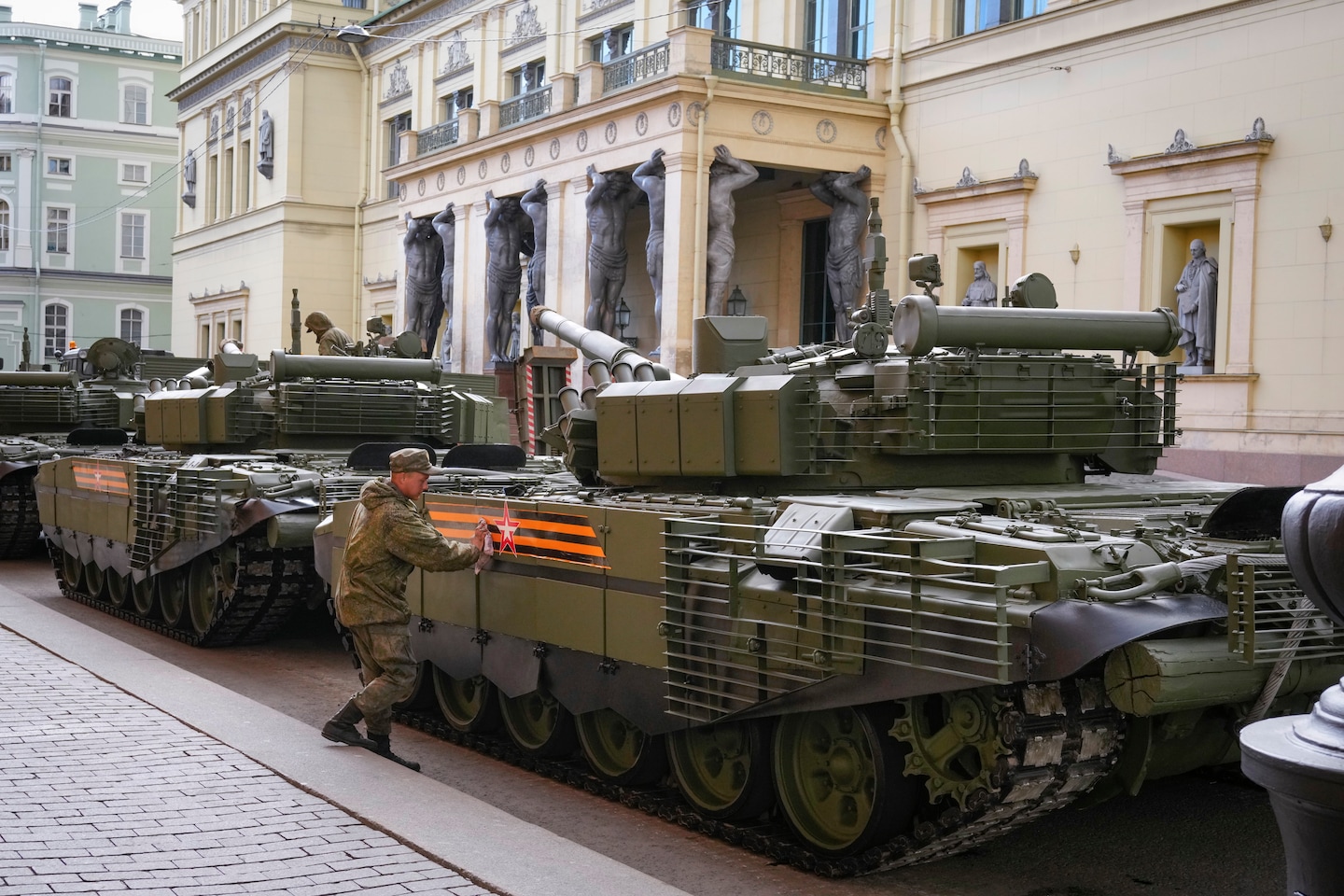You’re reading an excerpt from the Today’s WorldView newsletter. Sign up to get the rest, including news from around the globe, interesting ideas, and opinions to know sent to your inbox every weekday.
Russia’s Victory Day marks a war of competing nationalisms

Will Putin use the occasion to announce the annexation of new chunks of Ukrainian territory — as he did in 2014 when Russia seized Crimea? Will he cast himself as satisfied with Russia’s territorial gains in Ukraine’s south and east and move to draw down Russia’s euphemistic “special military operation” in its neighbor? Will he acknowledge that Russia is, indeed, fighting an actual war, an admission that could prefigure a general mobilization of Russia and intensification of the war effort?
While a lot remains uncertain, it’ll be difficult for Putin to declare mission accomplished on Monday. Russian forces moved into Ukraine in late February seemingly on a mission against “Nazis” that was designed to be swift and easy, but which has turned out to be anything but. The government in Kyiv — run, in part, by liberal Europhiles, not usurping fascists — has commanded both domestic and global support. Russia, meanwhile, is getting steadily cut off from the Western world and faces profound economic crisis. On the battlefield, Russian troops sustained heavy losses and were forced into a humiliating retreat on some fronts; on others, they have been bogged down and confronted by stiff Ukrainian resistance.
Russian officials had hoped to stage some sort of triumphant display in the strategic Ukrainian port city of Mariupol, whose capture remains one of the few military victories the Kremlin can boast. But Ukrainian fighters over the weekend still remain holed up in bunkers within a major industrial facility there, while the Russian siege of the city has left it in ruins. Even for Russian propaganda purposes, a smoldering desolation may be a tough sell.
That’s why, on Victory Day, the Russian leader will likely look to the past. “Putin is going to use this day to justify his war against Ukraine and to underline, as he believes, the historical mission of Russia to fight fascism,” Tatiana Stanovaya, the Paris-based head of R.Politik political consultancy, told my colleagues. “He has to legitimize his war, and he’s trying to present it to the world and to Russians as some kind of fight for historical justice.”
Stanovaya added: “The strategic problem that Russia is facing today is that Russian society has not been prepared for protracted and costly war. It wanted a fast, decisive victory, and Putin can’t give it to Russians.”
Instead, Putin can mostly offer his public a deep nationalistic grievance. In remarks delivered Sunday, he once again likened the battles in Ukraine to those fought in World War II. “Today, our soldiers, as their ancestors, are fighting side by side to liberate their native land from the Nazi filth with the confidence that, as in 1945, victory will be ours,” he said, in rhetoric that may be baffling to many observers elsewhere but is largely consistent with Putin’s neo-imperialist worldview.
Putin and his allies see themselves at war not just with the government in Kyiv, but an entire array of Western proxy forces, mobilized by the United States and other NATO member states, that are bent on undermining the will of the Russian people. In Putin’s own rhetoric, Ukraine is inseparable from Russia and shares not just the same mythic story of national origin — anchored in the emergence of the Kievan Rus a millennium ago — but national destiny. Therefore, for the Kremlin, no expression of Ukrainian national identity or aspiration for geopolitical independence can be tolerated, and all opposition to Russian influence has to be reduced to a story of “Nazi” perfidy and Russian victimhood.
The Ukrainians, of course, see this all rather differently, especially since Russia began carving away its sovereign territory in 2014. “In its imperial and Soviet guises, Russia looms over Ukrainian history as a colonial force of exploitation, assimilation, repression, and humiliation,” wrote Georgiy Kasianov, political historian at Maria Curie-Sklodowska University in Poland.
Though Ukraine was for centuries shaped and divided by overlapping empires, a distinct national tradition endures and has only gained in strength in the face of Russian bullying and warmongering. Ukrainians have pushed, for example, for the world to recognize the great famine in 1932-1933, where millions of Ukrainians died, as a genocide brought on by Soviet policies — known as the Holodomor, literally “to kill by starvation.” Russian officials have sought to block other governments from formally recognizing this history, casting the period instead as one of suffering for all Soviet peoples.
It’s a history that still flares animosities now, as Ukrainian officials and activists summon its legacy when accusing Russian forces now of carrying out wholesale theft of Ukrainian grain. “In many ways, this war is the collision of two incompatible historical narratives,” Kasianov wrote in Foreign Affairs. “Putin’s desire to restore an imperial Russia (of which Ukraine is but a constituent part) has crashed into a Ukrainian nationalism that imagines a sovereign Ukrainian state and a distinct Ukrainian people persisting in various forms for over a thousand years.”
Speaking to CBS News’s “Face the Nation,” Ukrainian ambassador to the United States Oksana Markarova said her country was prepared for whatever escalation may come from Putin after his Victory Day speech.
“We can count that Putin and imperialistic Russia will do everything that they can possibly try to do,” Markarova said. “The question is, are we all prepared — the civilized world — to do everything possible to defend our democracy and freedom? And Ukraine certainly is not only ready, but shows for the past 74 days that we bravely defend those values and defend our homes.”






